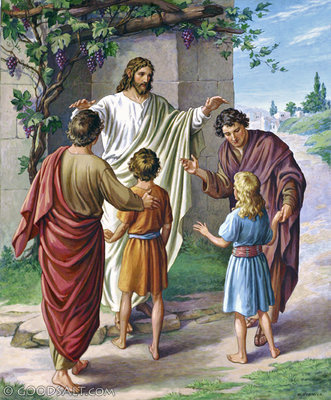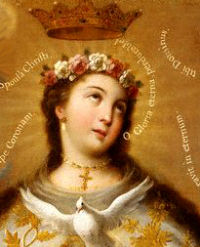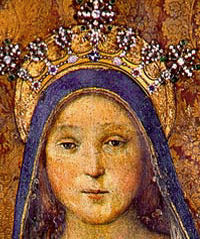Monday 25 August 2014

You have not chosen me: but I have chosen you; and have appointed you, that you should go, and should bring forth fruit; and your fruit should remain: that whatsoever you shall ask of the Father in my name, he may give it you. (Douay-Rheims Bible)

You have not chosen me: but I have chosen you; and have appointed you, that you should go, and should bring forth fruit; and your fruit should remain: that whatsoever you shall ask of the Father in my name, he may give it you. (Douay-Rheims Bible)
Mass
Introduction.
Fr. Raymond
took the theme from the Night Office from St. John Chrysostom saying, “You did not choose me, it was I who chose you”.
God chose each of us in the three great moments.
1. When he called out of nothing by creating us.
2. When he called us to the Christian Faith at Baptism.
3. When he called us to dedicate our lives to Him more closely in the monastic life.
[The divine chosen by creation,
we are chosen by Christ,
religious profession we have not chosen,
it is Christ who chose us].
God chose each of us in the three great moments.
1. When he called out of nothing by creating us.
2. When he called us to the Christian Faith at Baptism.
3. When he called us to dedicate our lives to Him more closely in the monastic life.
[The divine chosen by creation,
we are chosen by Christ,
religious profession we have not chosen,
it is Christ who chose us].
A Word in Season Readings for the Liturgy of the Hours
Augustine Press 1999
TWENTY-FIRST WEEK
IN ORDINARY TIME
MONDAY
Year II
First Reading
Titus
2:1-3:2
Responsory Ps 16:7-8;
Mt 19:17
I will bless the Lord who gives me counsel, who even at night directs my heart. I keep the Lord
always before me:+ since he is at my right hand, I shall stand firm. .
V. If you wish to enter into life, keep the commandments. + Since he is ...
Second Reading
From a homily of Saint John Chrysostom (Horn.
lnedite: Revue des Etudes Byznntines 29 [1971J 127-129)
You
did not choose me, it was I who chose you
"The grace of God has appeared, as our teacher."
Then, stand up! For we are again opening our treasure chest and again displaying
our pearls. Therefore let no one fail to observe the beauty of the words: Grace has appeared.
Why did the apostle
not say: "grace has been given"?
To make you understand that before grace
appeared human nature was living in darkness. For Christ appears to those
living in darkness, as indeed the prophet also foretold, when he said: The people
living in darkness have seen a great light. The grace of God has appeared bringing salvation. Do you see the
agreement of apostle and prophet? The people living in darkness. For such
is the nature of darkness that wherever it overtakes humanity it immediately holds
us down and stops us from going any further; our way becomes slippery and dangerous.
Therefore it was also to guide
ur idle nature
in the direction of virtue that the prophet said: The people living in darkness
have seen a great light.
But it is not only
this that the apostle's use of the word "appeared" shows us, there is
something else as well. It is precisely this: it is not we who looked for the light
and found it, but the light that has appeared to us; we did not go to him, he
came to us.
hrist's own words
also make this clear: You did not choose me, it was I who chose you. We
are constantly told that it is not our deeds that have won us salvation, but we
have all been saved by divine grace.
And that too is implied in the apostle's words: The grace of God has appeared.
56
What kind of grace? For there is both the grace of former times and the grace that John referred to, saying: We
have received grace upon grace. For even the grace of old was real grace, which freed the Israelites from
slavery in Egypt and countless other evils. But this grace is greater. For in the past it freed the people from the Egyptians,
but now it has freed them from the tyranny of evil spirits; then it freed them from
Pharaoh's rage, but now it is from the devil's grasp; then through Moses, now through
the only Son; then by means of a staff, not by a cross; then through the Red Sea,
but now through the water of rebirth; then it led the people out of their clay
and brick-making, but now out of death and sin; then it led them to a land flowing
with milk and honey, now to the kingdom of heaven.
Responsory Lv 20:7.26
Consecrate yourselves
and be holy, for I am the Lord your God. Keep my laws and obey them, for + it is
I, the Lord, who make you holy.
V. You must be holy
to me, because I, the Lord, am holy.+ It is I ...
+++++++++++++++++++++++++
A Word in Season Readings for the Liturgy of the Hours
Augustine Press 1999
One this day,
two alternative Reading are give below.
Saint Clement of Alexandria, Julian of Norwich (Revelations of Divine Love, 63)




 With the certainty of faith we know that Jesus Christ is king in the full, literal, and absolute sense of the word; for He is true God and man. This does not, however, prevent Mary from sharing His royal prerogatives, though in a limited and analogous manner; for she was the Mother of Christ, and Christ is God; and she shared in the work of the divine Redeemer, in His struggles against enemies and in the triumph He won over them all. From this union with Christ the King she assuredly obtains so eminent a status that she stands high above all created things; and upon this same union with Christ is based that royal privilege enabling her to distribute the treasures of the kingdom of the divine Redeemer. And lastly, this same union with Christ is the fountain of the inexhaustible efficacy of her motherly intercession in the presence of the Son and of the Father.
With the certainty of faith we know that Jesus Christ is king in the full, literal, and absolute sense of the word; for He is true God and man. This does not, however, prevent Mary from sharing His royal prerogatives, though in a limited and analogous manner; for she was the Mother of Christ, and Christ is God; and she shared in the work of the divine Redeemer, in His struggles against enemies and in the triumph He won over them all. From this union with Christ the King she assuredly obtains so eminent a status that she stands high above all created things; and upon this same union with Christ is based that royal privilege enabling her to distribute the treasures of the kingdom of the divine Redeemer. And lastly, this same union with Christ is the fountain of the inexhaustible efficacy of her motherly intercession in the presence of the Son and of the Father.


